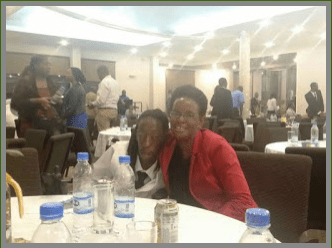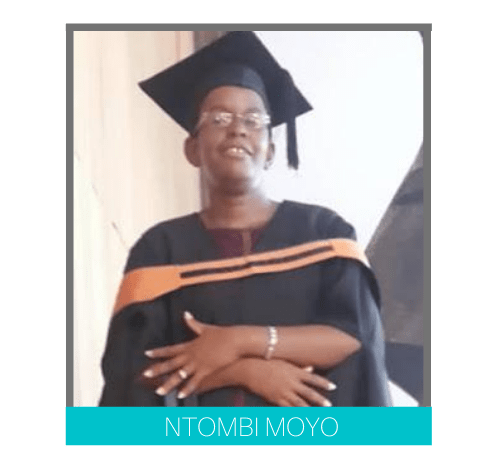Goodness and Mercy
She is beautiful, with a cool and engaging smile. She is calm and collected; the picture of serenity. She is one of the Praise and Worshipers who lead us to the presence of God as we worship at church. Hers is a rich baritone voice that enhances the choir. She is Ntombi Moyo; smart and helpful always. Ntombi is so loved by her husband Sifiso, and the three wonderful and vibrant boys; Lonkudumo Shalom, Dumisozayo Solomon and Simdumise Sean. Theirs is the epitome of a loving family who are always striving to do right in their relationships.

From left: Dumisozayo, Lonkudumo and young Simdumise with their dad.
It was not always like that. Ntombi’s life journey was incredible. It is not easy to connect this lovely woman with little Ntombi who had more questions than answers in her young life. Here is her story in her own words.
“I was a little girl of seven many years ago, amongst a large group of other children my age These were my fellow brothers and sisters who often screamed at each other as they squabbled over toys at Thembiso Children’s Home. If any adult passed by, there was often a sudden silence. We all just stared into nothingness when spoken to.
t was not always like that. Ntombi’s life journey was incredible. It is not easy to connect this lovely woman with little Ntombi who had more questions than answers in her young life. Here is her story in her own words. “I was a little girl of seven many years ago, amongst a large group of other children my age These were my fellow brothers and sisters who often screamed at each other as they squabbled over toys at Thembiso Children’s Home. If any adult passed by, there was often a sudden silence. We all just stared into nothingness when spoken to.
“Some of my brothers and sisters were brought into the institution because their parents were fighting over custody issues. Others had their parents incarcerated for various crimes such as theft, drug abuse and trafficking. In some instances, the children lived in situations of domestic violence and had to be removed and surrendered to the care of the state by the courts. It always puzzled me that all the other children knew what had brought them to Thembiso. My story was different. I did not know how I came to be there. No relatives came to visit me. That really bothered me. I wished I could ask any one of our mothers (oMama) who my parents were, how I came to Thembiso, when I would also be taken out like other children. But, they were always busy caring for almost 100 children. It painful to see some children housed at the Home and after a few months they were gone; either taken by parents, relatives or adopted. Sometimes I would overhear oMama feling sorry that no one had taken me. Then others would say, ‘Uzacina esenda emncane bakithi (She will end up marrying under-age). It was hard to hear such words spoken about me. I felt rejected, so alone. I did not belong. I was a true outcast.
“Life ground on, on its monotonous routine. I kept hoping and longing for a day I would also go out. I reminisced on having loving parents who would take me from this home or just an opportunity to visit relatives. I recall having ill-fitting clothes and shoes that had seen better days, when we went to Church. The diet was also a tedium of isitshwala (mealie porridge) and vegetables; cabbage or choumolier and beans.
“At Thembiso, we learnt to look out for one another. We developed survival skills. During the times when the portions were little for each child in the dining room, we organised ourselves into groups of six; who would forgo part of the meals to give to the half of the table so they could have more portions on that day. We would alternate on the following day. A system of family unit/sisterhood emerged. When some children fell sick without omama knowing, the sisterhood cared for the unwell member.
“There was petty theft always. When new clothing was allocated by the home, I hated losing my new things. There was no security for our possessions. I recall placing some new items under my pillow for safekeeping only to find them missing later in the day. I was distraught. Birthdays went by and most of the times I did not remember.
“At primary school age, we were taught to make our beds, clean our rooms and be ready when the bell rang to go for prayers, then go eat our precious breakfast, mealie porridge. We walked to Mafakela Primary School in less than 20 minutes. l did not like the way we were treated at school where we were branded as orphans from Thembiso. Ring worms easily identified us. We were called all sorts of names.
“Life may be hard, but the dreams God plants do not die. I always dreamt of being a social worker since teenage hood as we often saw Social Workers come to the institution. They always appeared elegantly dresses to us, and we held them in great esteem whenever they came to visit, though they never talked to us children.

Ntombi (fifth from left) in the Praise and Worship team
“After almost two decades of living in a children’s home, l became uncomfortable as the home had no one my age. One day I was called and told, ‘You are now 18 years old and you no longer have a bed here. There is a baby who has been abandoned on way to the here.’ Leaving the institution was a difficult transition for me. It was sudden and frightening for a young person who had had no preparation for life skills. The future looked bleak. Now I do thank the Lord for His amazing grace from the day l came into this earth, for He says in Jeremiah 29:11, ‘For I know the plans l have for you, plans to prosper you, to give you a hope and a future and an expected ending.’
“I was kindly taken by the Matron of the Home to her house to live with her family. This brought some relief. After the ‘O’ level results were announced, I was glad that I had passed. The family helped me to apply for a Rehabilitation Technician Course at Marondera. This course was for two years. As a girl child, the basic things that I needed such as sanitary wear, deodorants and lotions were not readily available. Some girls at college did not mind sharing their lotions and other personal grooming products. I thanked God for them. During school vacations I would go to the Matron’s home. At the end of the course, I got a job at King George VI Rehabilitation Centre as a rehabilitation technician, working with disabled children in Bulawayo.
I was ready for the next step in life. I met Sifiso Moyo at Brethren In Christ Church (BICC). He used to fellowship at Mpopoma while I was at Lobengula. We used to meet at youth services and at National Youth Camps. Our relationship blossomed, culminating in wedding bells. At BICC Lobengula, I had become attached to Pastor Glenn and Linda Ncube and their wonderful children who took me in as part of their family. With guidance from Rev Albert Ndlovu “Gegana”, the wedding formalities were done at Pastor Glenn Ncube’s place as they stood on behalf of my parents and the Church. I was a glowing and grateful bride. God had been so good to me. I was even more humbled by the acceptance I got from the Moyo family who received me with loving open arms.
“The weddings was awesome. I was overwhelmed by the people who came to attend. To me, it was like the wedding at Cana, where every good thing was in abundance, notwithstanding the terrible economic situation of 2007 in Zimbabwe. My dear sisters and brothers some from abroad made the day a great success through active participation and contributions.
“In 2009, with the help of Sifiso, my rock and best friend, I enrolled with the University of South Africa, UNISA, and succeeded in making my dream come true. I am now a Social Worker registered in both South Africa and the Zimbabwe Council of Social Workers. I have learnt to be a people-centred person and I am sensitive to those disadvantaged and affected by social ills. I connect them with possible officials, and other resources they need in their situations. I am also in the Compassionate Ministry at Church. I also work with the physically challenged people, and I am a volunteer with Endless Possibilities. There we assist people living with disabilities to be fully functional and integrated into the societies they live in.

Ntombi at table with one of the challenged children during a workshop in Harare
“I feel so blessed and do all that I do for the glory of God. My family adopted a children’s home in Bulawayo where we take time to visit the children. There I share my story with the boys so they can be inspired to do their best and succeed in life. What can I say? My favourite Scripture is alive to me. Since I learnt this Scripture as a child, I continue to say, surely goodness and mercy shall follow me all the days of my life (Psalm 23:6).

